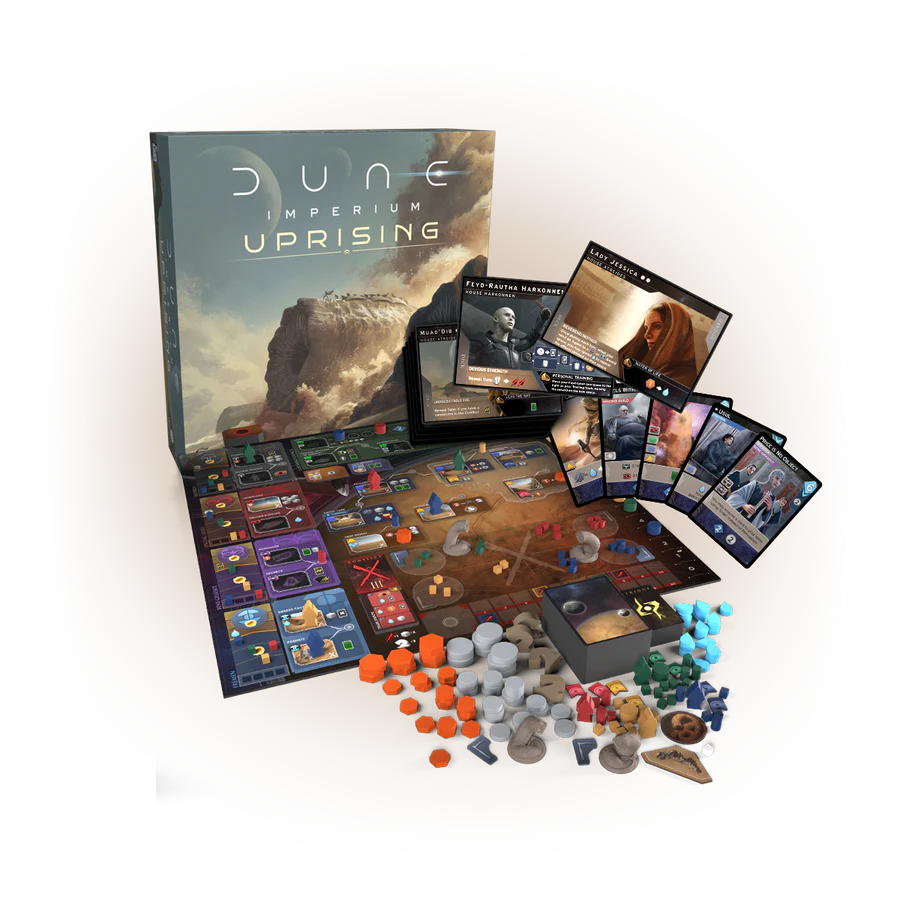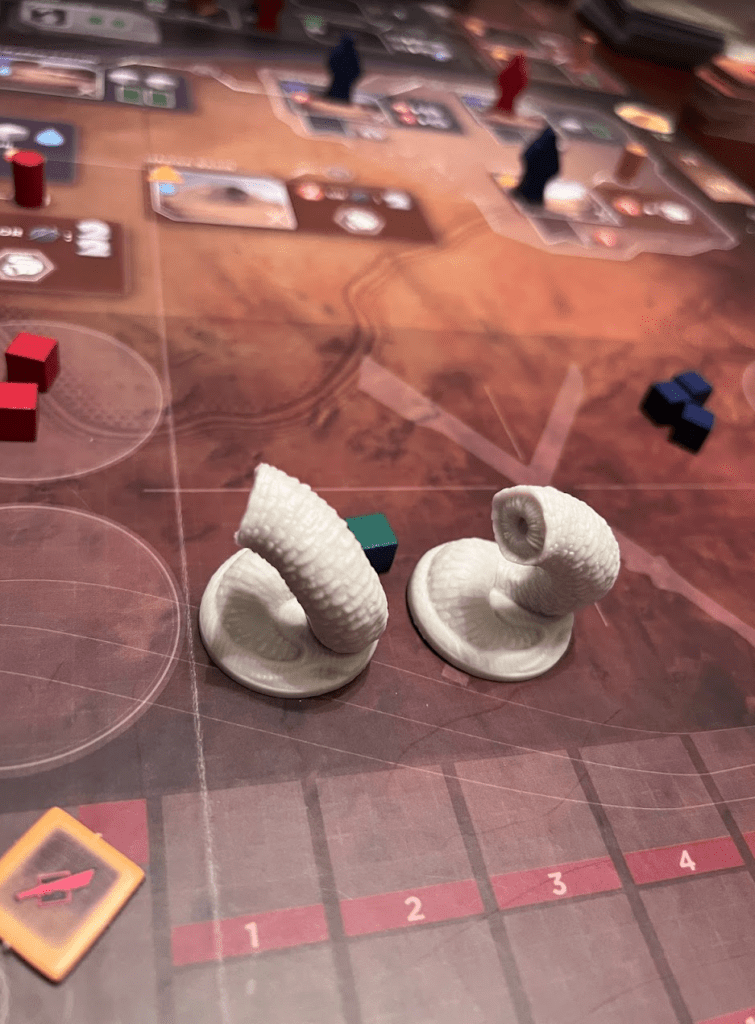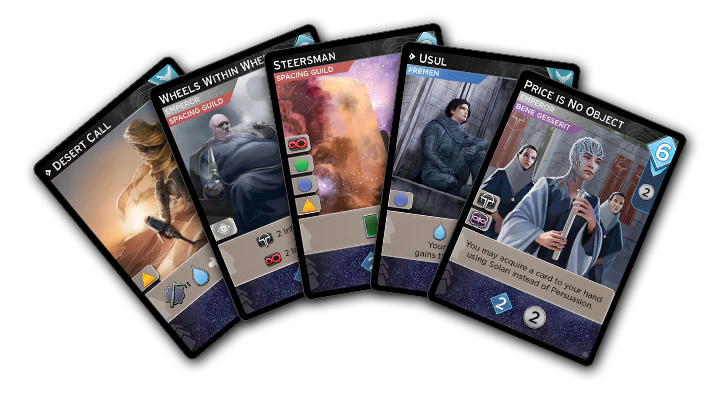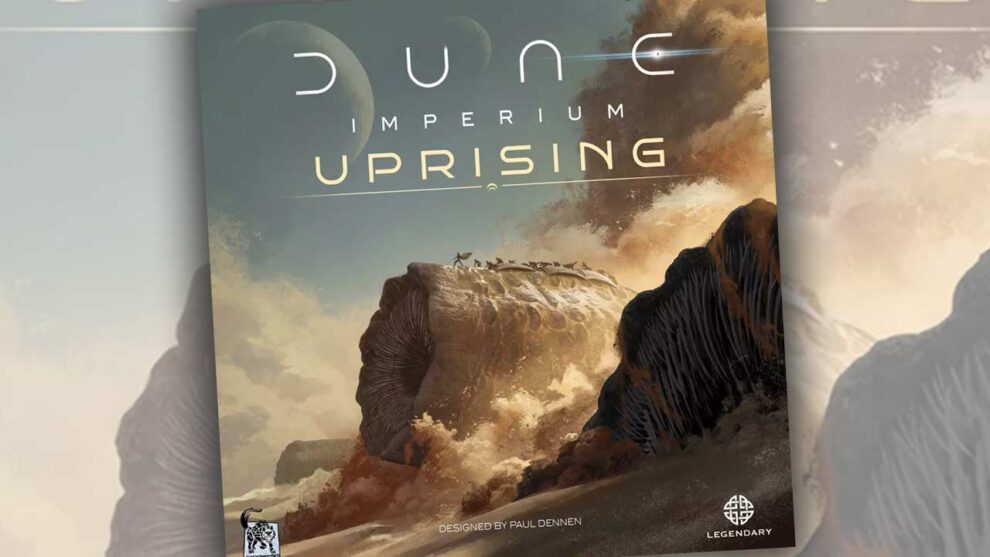Welcome (Back) to Arrakis
I wrote a glowing review of the original Dune: Imperium earlier this year. To say that I was enamored with it would be an understatement. The game has risen in the ranks to claim its spot among my top board games of all time, and I jump at the chance to introduce new players to it. I even snagged the new digital version on Steam and have already sunk about 20 hours into the challenges and weekly scenario modes there. This is all coming from someone who isn’t that taken by the world of the original Frank Herbert novels and has seen the Denis Villeneuve film a grand total of once.
At Gen Con this year, Dire Wolf Digital announced a “standalone spinoff” for the game titled Dune: Imperium – Uprising. Initially, much of the conversation around the new game was slightly confusing for the gaming community because it wasn’t clear how this would work with the existing Dune: Imperium properties. The publisher quickly clarified that both expansions for the base game can also work with this new spinoff game and that cards from the base game can be mixed and matched. It is an example of making the waters a bit too muddy for my liking. It’s a sequel and a spinoff, but it also works with the expansions for the original game, and it also works (kind of) with some handful of cards from the original game. It’s enough to make your head spin.
That’s not to mention the optional variants and mini-expansions in the Dune: Imperium – Uprising game box! Despite all this, I could not resist snagging a copy at PAX Unplugged. I spent my car ride home reading the rulebook and sleeving up all the cards the day after. That left me ready to put it through its paces and find out if it’s worth all the fuss.

Arrakis II: Electric Boogaloo
The nuts and bolts of gameplay in Dune: Imperium – Uprising are the same as the original game. Players will start with a deck of ten multipurpose cards, allowing them to send workers to spaces on the board or provide resources on economic turns at the end of each round. The hybrid worker placement and deck building are why I loved the original game, so I was thrilled to see it return in the spinoff. Players will race to collect ten victory points the fastest by gaining influence with factions, winning combats, and creating powerful economic engines to buy high-cost victory point cards. Similarly, the board spaces retain much of their general theming and functionality. Desert spaces give you spice, the populated areas let you stage military actions, and the Landsraad political apparatus enables you to gain permanent strategic advantages. The resources are mostly the same, fighting over water, Solari (currency), and Spice. By retaining these mechanics, designer Paul Dennen has clearly stated what it means to be a Dune: Imperium game. These aspects are immutable, and should more Dune: Imperium games be released, I expect them to show up there. The core gameplay loop just works.
Why did we need this version if all these foundational elements are the same as the base game? Well, theoretical contractual obligations aside, this is not Paul Dennen’s first brush with releasing multiple versions of the same game. He famously released three different versions of Clank! A Deck-Building Adventure, all of which have the same backbone but present different play experiences. This appears to be the same goal as with Dune: Imperium – Uprising. But what actually changed?
Shiny New Coat of Paint
Perhaps the most significant change is the introduction of spies. Spies are a different sort of worker placement mini-game on top of the core worker placement experience. While you send workers to spaces on the board to perform actions, you send spies to spaces adjacent to one or more board spaces. Having a spy present means you can recall the spy to play a worker to a spot where another player has placed a worker, draw a card if you play a worker to a spy-adjacent spot, or use a powerful recall spy conditional power on a card in your deck. Compared to the base game, you’re less likely to get completely locked out of important board spaces if you do a little planning ahead of time and set your spies up correctly.
The second significant change is the introduction of sandworms. If there is one point against the original Dune: Imperium, it’s that there just aren’t enough sandworms! If you poll a general population of people, the most identifiable element from Dune would be those gigantic sandworms that pop out of the desert. In the original game, they were relegated to appearing on some cards and the first player token. In Dune: Imperium – Uprising, they are a major part of combat. If you can obtain Maker Hooks throughout the game, you will earn the ability to use sandworms in combat. These big, beefy units are worth three combat strength each and allow you to double any rewards you receive from combat. Using them with your army takes a lot of resources, but they can be worth quite a large payout. There are specific conflicts in the deck that are protected by a massive shield wall, preventing the worms from getting inside and banning them from combat. However, a few ways throughout the game exist for a conniving player to destroy the shield wall, opening the gates to the worms to invade the protected combats.

Speaking of battle and combat, the final big change comes from the combat rewards. In the core game, most battles offered victory points to the winner from very early on. Here, victory points don’t become a reward for battle until much later in the deck. Instead, there are three different “battle icons” on the combat cards. When you win combat featuring two of the same icons, you score a victory point for having a matching pair of cards. Each player begins the game with one of the symbols already randomly in their hand, which creates varied incentives to go hard after specific combats earlier or later. In general, from a few games, the rewards for combat seem better for the second and third place players, meaning more people will try to out-jockey each other for the other rewards. The base game sometimes felt like combat wasn’t important unless you came in first place, so I’m happy that the new version corrects that.
That’s not to mention the mini-expansion in the box, the CHOAM module, which adds contracts to the game that give you one-time bonuses for accomplishing small goals like sending an agent to a specific spot on the board or harvesting a certain amount of spice. The game has a special two-player variant and a massive six-player asymmetrical team-based mode. While I haven’t tried either variant yet, the rules for both seem like a lot of fun, specifically with the six-player mode adding in two “commander” roles on each team that can send their allies units into battle against the enemy team. Additional boards, components, and cards in the box are only used in these variant modes. Like the original Dune: Imperium, I only play this game as a 3-4 player experience, but I am very excited to try out the team battle mode once I have enough players.
Better or Different?
With all these new changes (and not to mention a whole new set of cards for your deckbuilding pleasure), the question is whether the game feels fundamentally different enough to justify its existence. It’s an interesting question because two expansions on top of the core game make it all hard to answer, especially since Dune: Imperium – Uprising will also work with the expansions.
In terms of play style, there’s a much bigger focus on combat over the core game. The rewards are better overall despite there being fewer automatic victory points in the rewards. Sandworms add a massive economic investment to your strategy, but doubling your combat rewards can completely shift the game in your favor. By the time you’re churning through Tier 3 combat cards, someone winning with a sandworm could easily double their two victory points into four. That is a pretty massive swing in a game where the race is to get to ten points first.
The actual deck building felt better here, too. Granted, in one of the games, I played a leader who could trash cards regularly built into her kit, but through my testing, people are drawing through more of their deck and trashing cards way more often than in the base game. I often feel like I can completely Ship of Theseus my starting deck away bit by bit, whereas I never felt like I could remotely accomplish that in Dune: Imperium.

For now, if we’re comparing apples to apples, I prefer the experience of Dune: Imperium – Uprising over the original. Part of that could be recency bias, of course, but as a game player, I like games where you can explode with a combo in a single turn and flip the game on its head. It’s swingier, to be sure, and makes the game a much more tactical experience than deeply strategic. It feels much more reliant on the deck building half of the equation, partially because the existence of spies means the worker placement is less of an inconvenience. If someone blocks your spot, simply place a spy there and put a worker there anyway. Granted, this relies on having a reliable spy placement from cards in your deck or your leader, but I found it was usually available just enough that it wasn’t an issue.
That being said, I haven’t tried this one out with the expansions yet. Dune: Imperium combined with Rise of Ix is a damn near perfect board gaming experience for me, and this new spinoff on its own isn’t enough to topple that. I will try mixing in the expansions gradually and see how it all sits for me, but for now, the original core game coupled with Rise of Ix (and Immortality, if that’s your cup of tea) remains the king of the hill, but I’d recommend this new core game experience over the original to most players. All I know is, from my experience with Dune: Imperium – Uprising, there’s some exciting space to explore in revisiting core game designs and twisting them on their head. With a few minor tweaks and newly added systems, Uprising creates a more explosive, combat-focused experience that starkly contrasts the original game’s slower, strategic pace. With more Dune media properties on the horizon, I anticipate more Dune: Imperium someday as well, and I’m all for it. The foundation is strong enough that I’ll keep coming back for more.













As a fan of the books, I have been wanting to get a Dune game to the table. I hope to soon (fingers crossed).
Thanks for a great review!
I feel I don’t NEED more combat-focused gameplay in my Dune Imperium plays, so I am not sure I would enjoy this Uprising better for that. I still have not played Immortality nor Uprising, so I will keep away from any comment. Maybe they both will be worth a place in collection 🙂